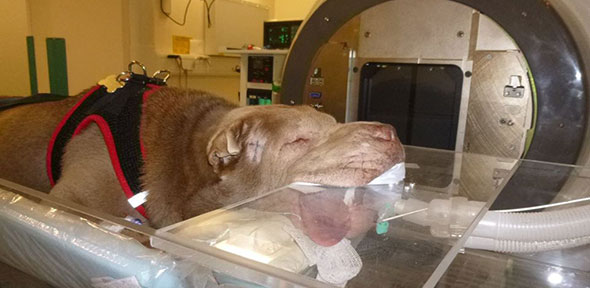Training Programme
Duration
One year in the first instance, renewable for periods of one year up to a total of three years.
Aims of the Senior Clinical Training Scholarship (SCTS)
The Scholarship is a training position designed to provide a good foundation in all aspects of veterinary diagnostic imaging and as training for the European Diploma in Veterinary Diagnostic Imaging.
The Scholar will be under the direct supervision of the Clinical Supervisor and Programme Director:
Marie-Aude Genain, Docteur Vétérinaire, MSc, AFHEA, Dip ECVDI, MRCVS
European Veterinary Specialist in Diagnostic Imaging
RCVS recognised specialist in Diagnostic Imaging
Principal Radiologist
With additional supervision from:
Professor Michael Herrtage MA BVSc DVSc DVR DVD DSAM DECVIM DECVDI MRCVS
RCVS Recognised Specialist in Small Animal Medicine European Veterinary Specialist in Companion Animal Internal Medicine
Emeritus Professor of Small Animal Medicine
Paddy Mannion BVMS, DVR, Dip ECVDI, MRCVS
Director of Cambridge Radiology Referrals.
Time allocation
At least 66% of time during the SCTS should be spent on managing clinical cases through the diagnostic imaging department. Up to 40% but not less than 8 weeks of time will be allocated each year for study and holidays.
Over the three-year SCTS, time will be spent in the following areas:
· Radiography and radiology
· Diagnostic ultrasonography including echocardiography
· Magnetic resonance imaging of small animal cases
· Scintigraphy
· Computed tomography
· SCTS research project
· Remaining time spent as private study / writing papers
The clinical training will utilise the small and large animal cases referred to the Hospital and the first opinion cases seen at the RSPCA Clinic and the Equine and farm animal Clinics. The SCTS will be expected to discuss cases with the relevant senior clinicians. Attendance is expected at daily film reading rounds and Hospital rounds as well as small animal and equine seminars, weekly journal club meetings, clinico-pathological meetings and pathology rounds.
The SCTS will be required to undertake a course in medical physics at the Clinical School at Addenbrooke’s Hospital.
Resources
This SCTS programme will be based at The Queen’s Veterinary School Hospital, University of Cambridge.
The Hospital facilities include:
· Diagnostic imaging capabilities including x-ray, ultrasonography, MRI, scintigraphy, fluoroscopy and CT
· Fully equipped and staffed diagnostic facilities for the examination and treatment of small and large animal medical and surgical conditions
· Fully equipped and staffed small and large animal theatres. There is a state-of-the-art small animal surgical suite and five operating theatres, including endoscopy and laparoscopy
· Fully staffed nursing wards and intensive care facilities
· On site clinical pathology and histopathological staff and laboratories
· A well-stocked veterinary library and access to the local human teaching hospital (Addenbrooke’s) library.
· Easily accessible computer and internet facilities with access to on-line journals
Emergency service
The SCTS will participate fully in the out-of-hours diagnostic imaging rota gaining valuable and essential experience in managing the diagnostic imaging needs of urgent and emergency cases. Participation in the out of hours weekday and weekend rota is shared. Full back-up cover is provided by senior surgeons, physicians, radiologists and anaesthetists.
First opinion practice
The SCTS will participate in the rota for attendance at the first opinion practice.
Departmental Structure and SCTS Training
The Department has a well-established and highly successful diagnostic imaging SCTS programme with an outstanding achievement for specialist qualifications of the Royal College of Veterinary Surgeons and the European College of Veterinary Diagnostic Imaging.
Teaching and Continuing Professional Development
The SCTS will be expected to attend the day release courses organised by the University of Cambridge on teaching and learning in higher education. These courses deal with education methods (lectures, seminars and small group teaching etc.) for lecturers involved in tertiary education. There are also computer and audiovisual courses available.
Scholars have to prepare and attend presentations given by and to members of the department for critical appraisal by colleagues in the Hospital. In addition to this, continuing education presentations to patient owners, veterinary surgeons and nurses will be a requirement of the SCTS programme.

